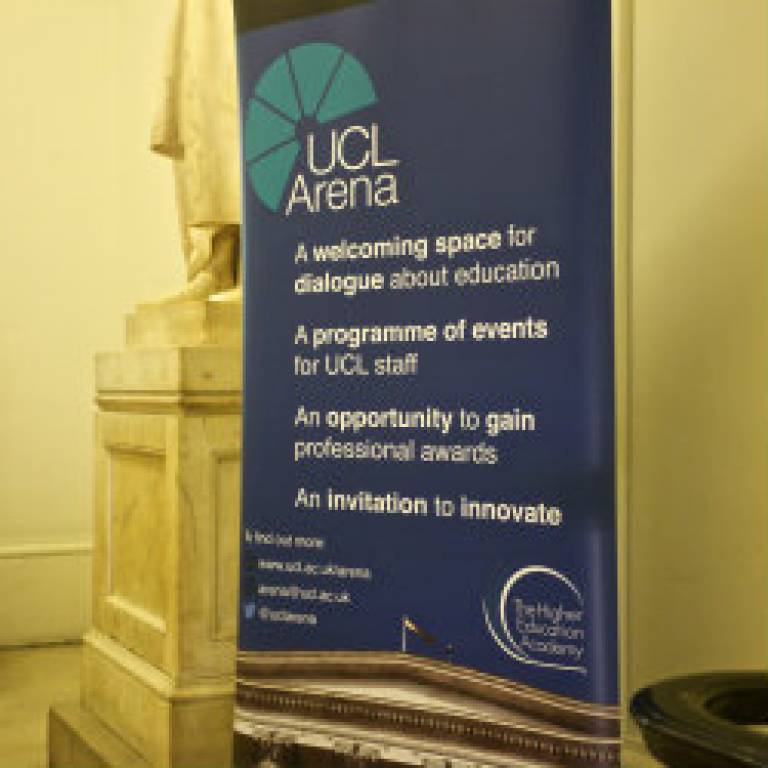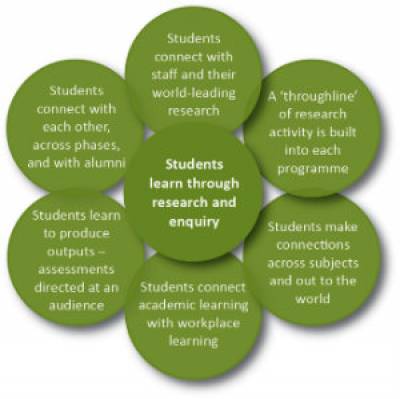Provost's Long View: UCL Arena, Connected Curriculum and advancing research-based education
29 January 2015
In recent weeks I have, not surprisingly, written much about our outstanding research success and the results of REF 2014 - an achievement that continues to resonate around the sector, both in the UK and internationally.

However, if we are to be a truly world-leading university, we must perform to the same very high quality in our educational provision. Against that background it is important to remind ourselves just how intrinsically our research is being deliberately and widely connected with our teaching as a core feature of the UCL 2034 strategy.
Principal Theme Two commits us to becoming, "A global leader in the integration of research and education, underpinning an inspirational student experience".
In practice, this means developing the critical independent thinking skills of our students, so that they become confident problem solvers - well versed in communicating complex information and experienced at working in a team.
A springboard to development
If we are to enhance research-based education and equip students with these skills, we will need to think differently about staff development, reward and recognition - and that is where UCL Arena comes in.
Launched in April 2014, the scheme is a springboard to development - open to everyone who teaches, supervises research or supports learning in any way. It's accredited by the Higher Education Academy in line with the UK Professional Standards Framework. This means it offers staff a route to professional recognition for their teaching expertise through Associate Fellowship, Fellowship or Senior Fellowship of the Higher Education Academy.
UCL Arena has three branches. Arena One is for postgraduate teaching assistants and offers the Teaching Associate Programme to support them in attaining Associate Fellowship.
Arena Two is aimed at teaching fellows or lecturers who need a teaching qualification to complete their probation. Through a series of activities - such as dialogue with peers and observing their teaching - it requires applicants to ask themselves what they want their students to gain from their teaching.
The third branch, Arena Open, is open to anyone who enables students to learn - be it through teaching or leading on an area of education. As such, it not only caters for those colleagues who missed out on gaining a teaching qualification earlier in their career and for education leaders, but also enables our enormously important support staff, such as learning technicians and librarians, to gain overdue recognition.
Awards gained through UCL Arena can make a significant contribution to an individual's application for promotion, by providing peer-reviewed evidence of successful practice.
Early success
I have been very pleased to see how enthusiastically the UCL community has embraced UCL Arena. I know that applicants find it empowering, especially in the way that it gives them the space to reflect on their teaching and realise how much they've achieved.
So far, Arena events have attracted 2,300 participants and scored an average satisfaction rating of 4.4/5. More than 100 Fellows were recognised in 2014, and, most recently, Professor Anthony Smith presented 20 Associate Fellows, four Fellows and eight Senior Fellows with their UCL Arena certificates at a well-attended reception in the North Cloisters on 19 January.
Even so, as an institution, we still have some way to go. According to figures for 2013/14, UCL had 10.66% of academic staff as Fellows, while the Russell Group average was 16% - a figure that is expected to rise for 2014/15.
I have every confidence that we will soon overtake our Russell Group peers. For this to happen, though, I would ask those members of staff who are already HEA Fellows to maintain their relationship with UCL Arena by volunteering to assess new applicants' work or offer mentoring to them.
I also know that the team would welcome contributions to this year's Teaching and Learning Conference - the deadline for proposals has now been extended to Monday 2 February.
A new standard for education at UCL
There is little point developing our academic staff to deliver research-based education, if we don't push for similar innovation in the courses that our students study.

That is why we've launched Connected Curriculum, a university-wide framework that centres around the core principle that "Students learn through research and collaborative enquiry", and has six related dimensions (see diagram).
The framework is designed to enable students to experience the challenges and achievements of researching in their subject field, and to understand and engage with research currently being undertaken by academics. Promoting a greater awareness of international contexts, Connected Curriculum also provides a means of building on UCL's already successful Global Citizenship programme. It promotes opportunities for students and staff from very different disciplines to collaborate in interdisciplinary spaces. The innovative BASc programme, which develops research-based expertise in arts and sciences, is a forerunner of these principles, as is our new Integrated Engineering Programme.
Students as partners
Of course, if we are to achieve our ambitions for research-based education and the student experience, it is crucial that our students are treated as equal partners in the process.
This simple principle is at the heart of UCL ChangeMakers, a wide-ranging initiative that will be launched fully in April 2015, and enables students to contribute to, and even lead on, institutional change. This will see them closely engaged with the Connected Curriculum initiative at all levels of activity and UCL Arena.
A key strand of UCL ChangeMakers that has already launched is a scheme called UCL ChangeMaker Projects. It offers funding to interested students, working in small teams, to carry out research into a student experience or curriculum-related problem, and come up with ideas, to implement in partnership with their department or faculty, on how to address them.
This scheme provides a great way for students to enrich the educational experience that they and their peers receive, while enhancing their CVs in the process.
Ever since I arrived at UCL and throughout the drafting of UCL 2034, I have made clear my passionate belief that a university of our stature should be exceptional not only at teaching our students, but also at inspiring them.
As I've outlined, significant progress has been made and we will see the considerable rewards over the next few years. With our merger with the IOE now complete, though, we truly have the expertise and experience to lead the field in terms of thinking and development about teaching and learning in higher education.
Professor Michael Arthur
UCL President & Provost
 Close
Close

